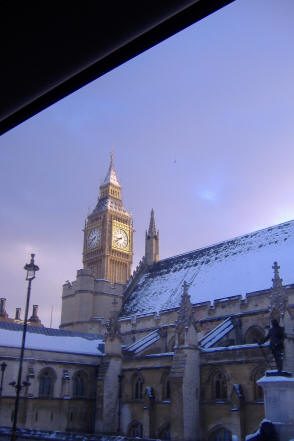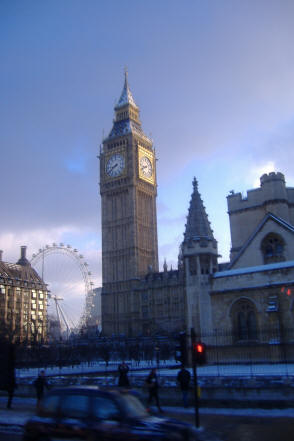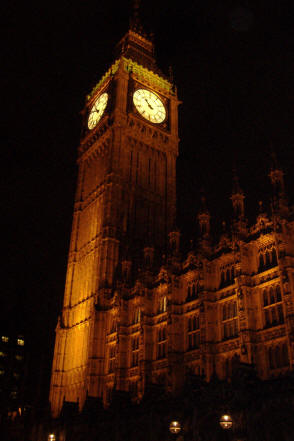Welcome to the new
Scotland where all political
parties coexist peacefully in harmony and mutual respect – except
the Greens! Scotland’s budget, presented by Finance Secretary John
Swinney, passed through Parliament this week like a galleon under
full sail. It is essentially, indeed almost exactly the same budget
that fell last week on the casting vote of the Presiding Officer.
This week it passed by 123 votes to 2. The two who voted against
were the two Green members, although it seemed to me that Robin
Harper – the elder statesman of the Greens – was uncomfortable with
the position that they were taking.
That’s the second time in eight
days that the Greens have voted against a budget that contains
excellent provision for addressing climate change, for insulating
houses, for creating lots of renewable energy sources, and so on. I
find their position a bit difficult to understand and many of my
colleagues feel the same way. The other parties, though – the
question that raises itself up to be answered is why they changed
around over the space of a week?
The Conservatives were already on
board, they’d come in with a sensible negotiating position and got
some stuff from the budget, so you can see that they were going to
be content to hang fire, vote with the Government and bring home the
bacon on what they had already secured. Labour and the Lib Dems
were the two parties who did the old Dick Whittington number and I
believe it’s because they stared into the abyss of public
disapproval of their actions and their stomachs churned at what they
saw.
No-one likes to see politicians
playing petty party politics for the sake of a few newspaper
headlines, they want to know that we’re getting on with our jobs and
getting the work done. That’s why the stern frown of disapproval
was on the collective face of the Scottish electorate and that’s why
the opposition parties were not keen to keep pressing. That’s the
reason why they turned and supported the budget.
Speaking of Dick Whittington, the
budget vote forced me to cut short my attendance at a conference in
London. It was a conference
on trafficking – a horrendous crime, but one that seems to be
committed fairly regularly across the globe. Organised by the
Commonwealth Parliamentary Association, the conference brought
together people from around the globe to Westminster. I was
particularly impressed with the Swedish attitude to prostitution –
they simply do not accept prostitution as being socially acceptable
– a massive reach from where we are, but they changed societal
attitudes and we can do the same.



Cutting off the customer demand
would reduce the economic incentive for these criminals to traffic
women across borders. Changing society is a long-term aim but we
need, in the short term, to be examining the way we treat the
victims of trafficking. There’s a Bill going through
Westminster just now that would
criminalise the victims for not having travel documents – hardly
helpful.
There’s a lot of work to be done
there yet, and the UK Government is travelling in the wrong
direction, so we can expect this to remain an issue for quite some
time to come.
In a strange parallel, there was a
debate on trafficking in
Edinburgh on the day I got back. It was Member’s Business and
followed the budget debate so there was little publicity on the
debate but it is important and I’ll be doing what I can to keep it
in the public eye.
The Westminster Parliament has an
impressive building, by the way, but the atmosphere is awful with
MPs getting a preferential treatment wherever they go and most of
them loving it. I much prefer our Parliament at Holyrood where you
get the same treatment whether you’re the First Minister or part of
the cleaning staff. MSPs take their place in the queue for lunch
alongside security staff, our parliamentary staff wait for coffee
beside committee clerks, and so on. The egality is a part of
Scotland and so much more
comfortable than the fluff and flummery in London.
This week ended with a debate on
the Early Years Framework, another one of our election pledges being
fulfilled. It’s quite clear that it’s vitally important to reach
children at a very early age if you want to improve their life
chances and to improve the contribution they make to society. Most
parties were behind the sentiment of the motion and the Framework,
except Labour who felt they had to make a point about the number of
nursery teachers. Interestingly, their facts were wrong – teacher
numbers are increasing and we’ve stopped the double-counting that
was going on before, so their chance to make a positive contribution
to a worthwhile debate was lost for the sake of incorrect
information.
One other note of interest from the
week – I had a question to ask of Kenny MacAskill this week, so I
asked about the case of the former police officer who was convicted
of rape and is now suing to have his pension rights reinstated.
He’s using public money through Legal Aid to try to get more public
money in the shape of the pension rights that were withdrawn from
him when he was convicted of a terrible crime which was committed
while he carried the trust of the public in the uniform of a serving
police officer.
I think that that’s just wrong and
I asked Kenny to look at changing the Legal Aid rules to try to stop
this kind of thing happening in the future. Kenny agrees with me
that the rules should be looked at, and he’s promised to do that.
He’s a good and caring politician is Mr MacAskill – in spite of his
gruff reputation – and I’ve got a lot of respect for what he’s doing
in the Justice portfolio.
Talking about portfolio –
Scotland’s art port6folios were
swelled this week when the purchase of the first Titian was finally
completed. A lot of money - £50 million – that some people are
saying would be better spent elsewhere and some other people are
saying should not have been given to the Duke of Sutherland, but I
think the truth is that you should take these opportunities when
they are presented to you. Our Culture Minister, Linda Fabiani MSP,
was quite right to lead the charge to secure these paintings for the
nation. Not only do they bring a lot of visitors here and help keep
earnings up, they enrich the culture of our nation and help keep its
pride up. One or two paintings won’t do that on their own, but they
help. In terms of artistic value these paintings are right up there
with the Mona Lisa – can you imagine France allowing the Mona Lisa
to go? Perhaps it’s time to look at marketing them more, there’s no
reason why the Scottish National Galleries shouldn’t rival the
Louvre, is there?
Should we have paid the Duke of
Sutherland? Well, he owned them so, unless we were going to
appropriate them without payment, yes. I’ve had emails in from
people calling him some names and I can see where the anger comes
from but it’s misplaced. The current Duke is not the man who
cleared Sutherland and whose statue looks out over Golspie – and he
doesn’t live in Dunrobin. I don’t think that he’s even a direct
descendant of that first duke, cousins having inherited the title on
a few occasions (which is why the castle is owned by someone else).
He’s a borders farmer – wealthy, obviously – who is simply rejigging
his assets. I believe we might have got a bargain.
Linda’s other big thing this week
was an announcement on the way forward for
Scotland’s creative industries –
well worth a wee read and you can find the announcement on the
Scottish Government’s website -
http://www.scotland.gov.uk/News/Releases/2009/02/05125752
I’m off now to get some fish and
chips in the canteen before I head homewards.

